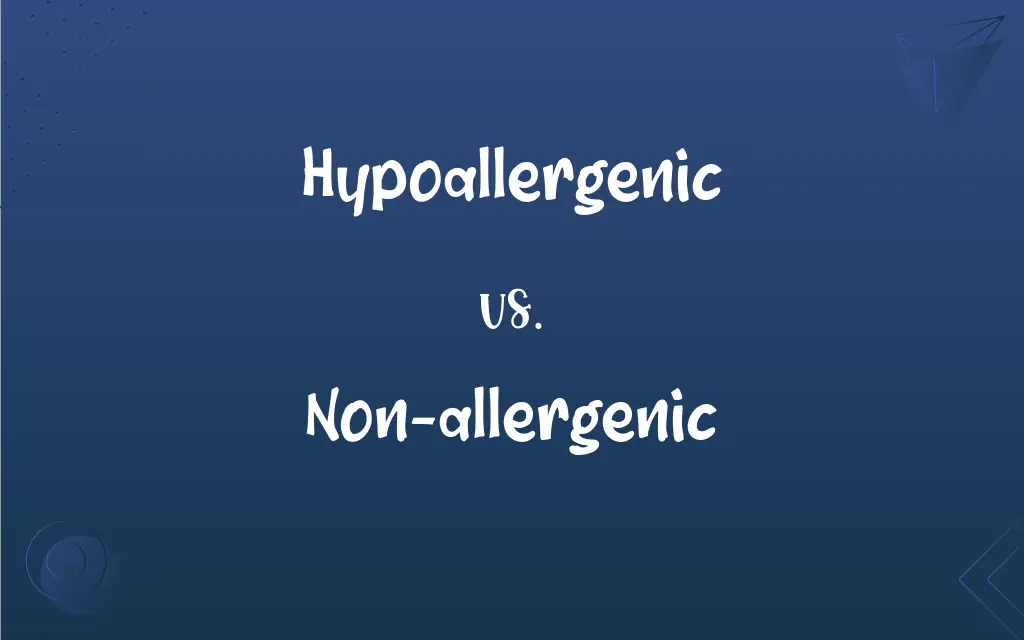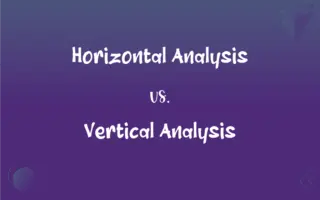Hypoallergenic vs. Non-allergenic: What's the Difference?
By Janet White || Published on November 10, 2023
Hypoallergenic means less likely to cause allergies, while Non-allergenic means it won't cause allergies at all.

Key Differences
Hypoallergenic products or substances are designed to reduce the risk of allergic reactions, but they don't eliminate the risk entirely. On the contrary, Non-allergenic implies that the product or substance will not cause an allergic reaction at all.
In the beauty and healthcare industries, Hypoallergenic often refers to products that have been formulated to minimize the likelihood of causing an allergic response. Non-allergenic, however, suggests a stronger assurance that the product will not be a source of allergens.
When considering pets, Hypoallergenic breeds might still produce allergens, but in much lower quantities compared to other breeds. Non-allergenic, in this context, would mean the pet doesn't produce any allergens, although such a claim is rare.
In fabrics and materials, Hypoallergenic denotes that the fabric is less likely to irritate sensitive skin or cause allergic reactions. In contrast, Non-allergenic fabrics are those that are inherently free from allergens or have been treated to be so.
Comparison Chart
Allergy Risk
Reduced but not eliminated.
No risk.
ADVERTISEMENT
Usage in Products
Common in beauty and health products.
Suggests a stronger assurance against allergens.
In Pets
Breeds producing fewer allergens.
Would mean no allergens produced, but such claims are rare.
In Fabrics
Less likely to irritate or cause allergies.
Free from allergens or treated to be so.
Guarantee
Doesn't guarantee absence of allergens.
Guarantees no allergenic substances present.
Hypoallergenic and Non-allergenic Definitions
Hypoallergenic
Can still contain minimal allergens.
Hypoallergenic cats still produce allergens, but in reduced amounts.
ADVERTISEMENT
Non-allergenic
Ensures absolute safety against allergens.
The Non-allergenic seal on the package gave her peace of mind.
Hypoallergenic
Often used for sensitive products.
The Hypoallergenic pillowcase helps reduce nighttime allergies.
Non-allergenic
Completely free from substances that might cause allergies.
The Non-allergenic stuffing is perfect for children's toys.
Hypoallergenic
Less likely to cause allergic reactions.
The lotion is Hypoallergenic, making it suitable for sensitive skin.
Non-allergenic
Guaranteed not to cause allergic responses.
The insulation is Non-allergenic, making it safe for all homeowners.
Hypoallergenic
Formulated to reduce allergenic risks.
Hypoallergenic earrings are designed for those with metal sensitivities.
Non-allergenic
Contains no allergens.
The Non-allergenic fabric ensures no allergic reactions.
Hypoallergenic
Not allergen-free but minimizes allergen presence.
She chose a Hypoallergenic detergent to reduce skin irritations.
Non-allergenic
No risk of allergenic reactions.
The clinic used Non-allergenic gloves to ensure patient safety.
Hypoallergenic
Having a decreased tendency to provoke an allergic reaction
Hypoallergenic cosmetics.
Non-allergenic
Alternative spelling of nonallergenic
Hypoallergenic
Containing fewer allergens; minimally allergenic.
Hypoallergenic
(immunology) Relating to a hypoallergen.
FAQs
Is Hypoallergenic makeup safe for all skin types?
While Hypoallergenic makeup is designed for sensitive skin, it's still possible for some to react to it.
Is Non-allergenic better than Hypoallergenic?
Non-allergenic means it won't cause allergies at all, while Hypoallergenic just reduces the risk.
Are there truly Non-allergenic pets?
No pet is truly Non-allergenic, but some produce fewer allergens than others.
What does Hypoallergenic mean?
Hypoallergenic means the product or substance is less likely to cause allergic reactions.
Are all "fragrance-free" products Non-allergenic?
Not necessarily. "Fragrance-free" means no added fragrances, but other allergenic ingredients might be present.
How reliable are Hypoallergenic labels?
They indicate reduced allergenic potential, but reactions can still occur based on individual sensitivities.
Why might someone choose Hypoallergenic products?
They might have sensitive skin or a history of allergies and want to reduce the risk of reactions.
Can someone still have an allergy to a Hypoallergenic product?
Yes, Hypoallergenic products reduce the risk but don't eliminate it.
Are there Non-allergenic alternatives for most products?
Yes, there are often alternatives, but one should read labels and test products if concerned.
What should I do if I react to a Non-allergenic product?
Discontinue use, consult a doctor, and report the reaction if severe.
Are children's products typically Hypoallergenic or Non-allergenic?
Many are designed to be gentler, but it's always crucial to read labels and test if concerned.
How can a product claim to be Non-allergenic?
It should be free from any substances known to commonly cause allergic reactions.
Why are Hypoallergenic products more expensive?
They often undergo more rigorous testing and formulation to ensure reduced allergenic potential.
Are Non-allergenic claims regulated?
In some industries and countries, but claims can vary in stringency.
Is there a test to prove a product is Non-allergenic?
There's no definitive test, but products can be tested on sensitive groups or analyzed for allergenic ingredients.
Can Hypoallergenic products contain natural ingredients?
Yes, but natural doesn't always mean non-allergenic.
Do Hypoallergenic and Non-allergenic mean the same in all industries?
No, interpretations can vary, so it's essential to understand the context.
Can a Hypoallergenic product have fragrances?
Yes, but they're typically milder or derived from less allergenic sources.
Why don't all products aim to be Non-allergenic?
Some ingredients that can be allergenic to a minority have significant benefits for the majority.
Are Hypoallergenic products always safer?
They reduce allergenic risks but aren't guaranteed to be safe for everyone.
About Author
Written by
Janet WhiteJanet White has been an esteemed writer and blogger for Difference Wiki. Holding a Master's degree in Science and Medical Journalism from the prestigious Boston University, she has consistently demonstrated her expertise and passion for her field. When she's not immersed in her work, Janet relishes her time exercising, delving into a good book, and cherishing moments with friends and family.







































































